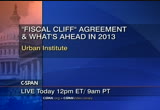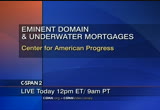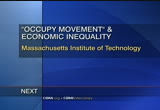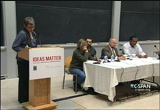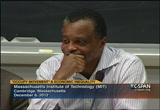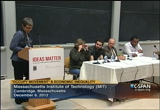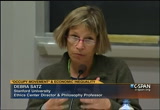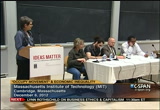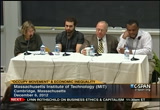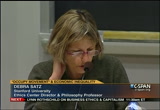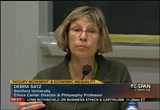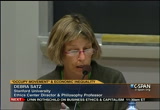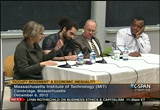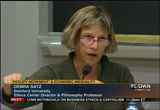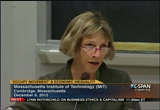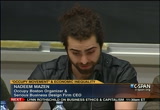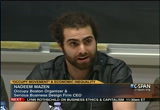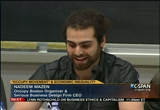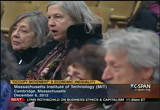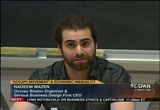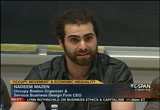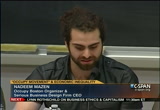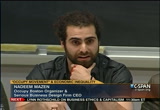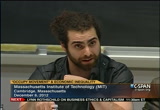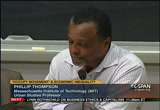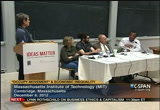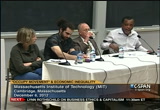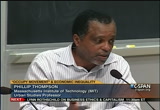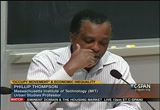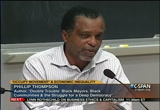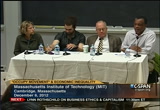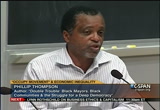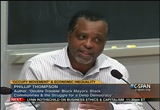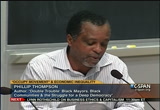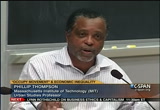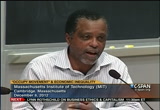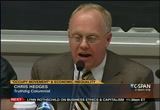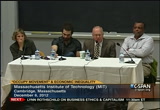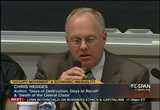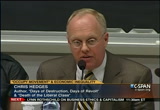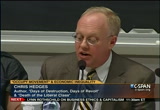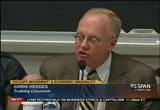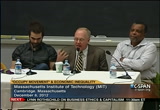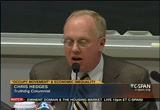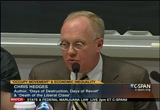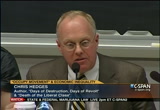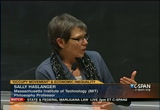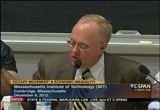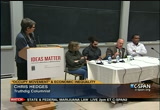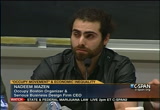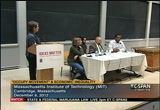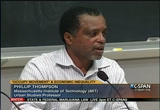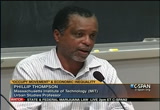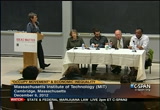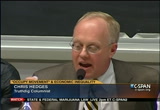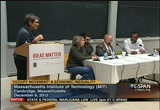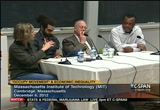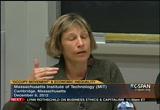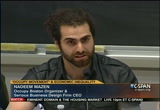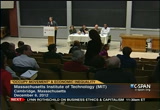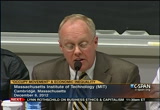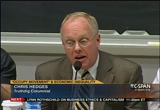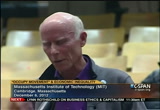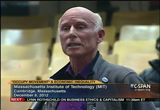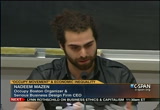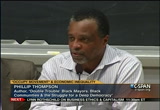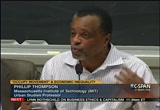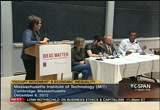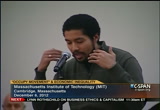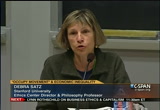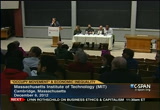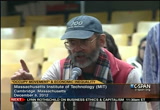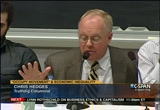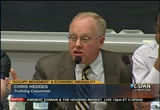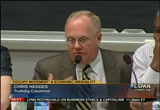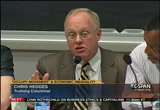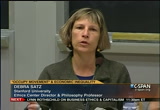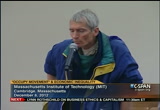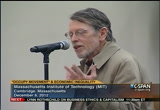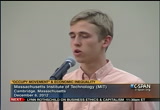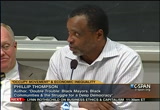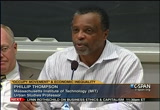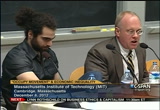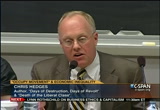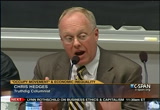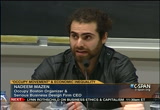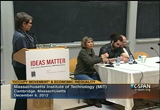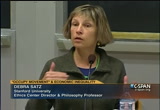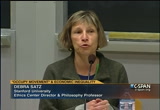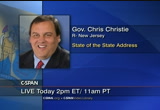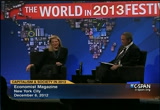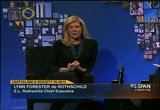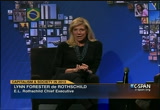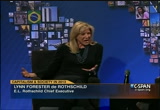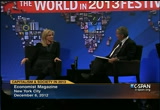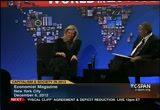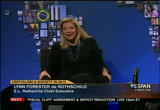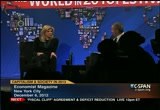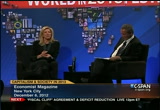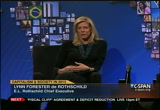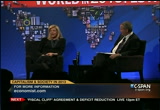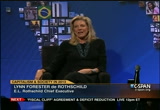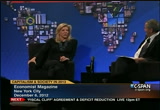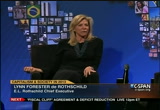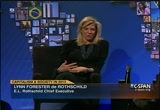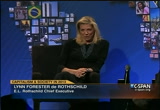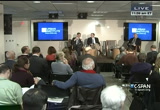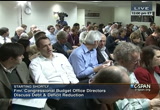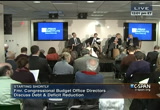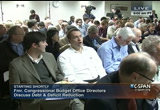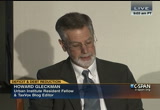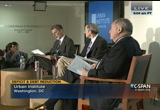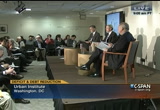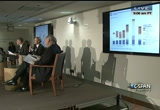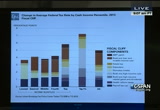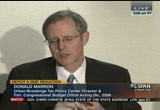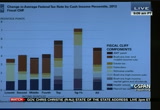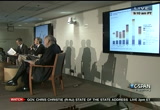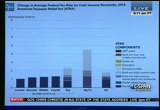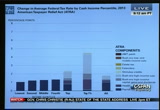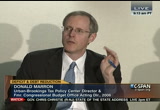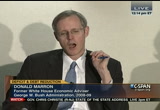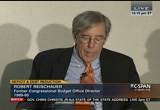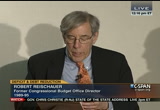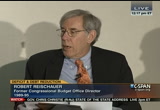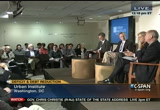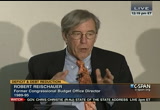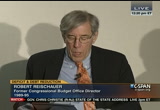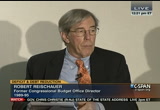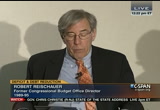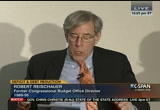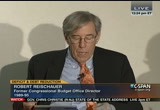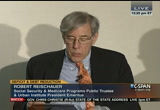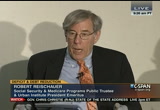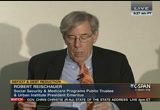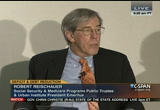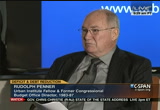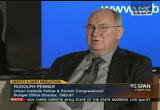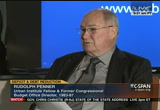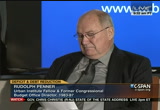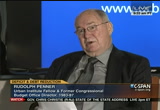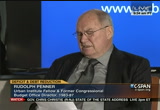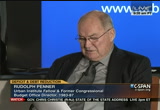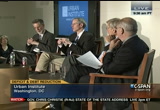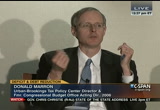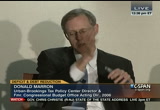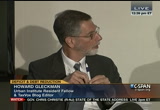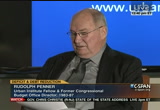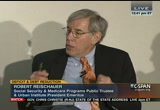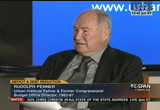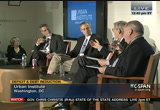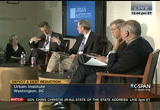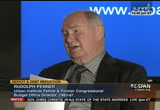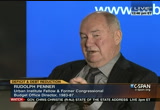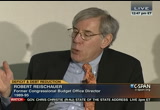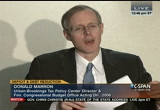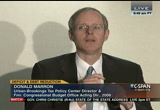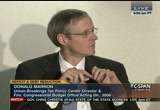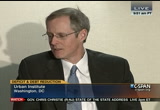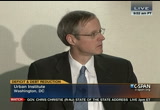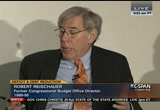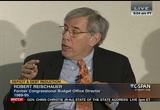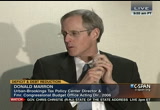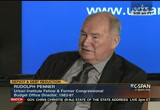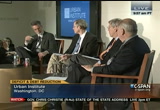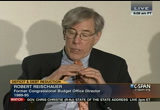tv Public Affairs CSPAN January 8, 2013 10:00am-1:00pm EST
10:00 am
on debt and deficit reduction and the fiscal cliff agreement reached by congress last week. that is from the urban institute here in washington. chris christie delivers the annual state of the state address. he is expected to address federal funding from hurricane sandy will leave. lawmakers are expected to take up an additional $50 billion in the coming weeks. that is scheduled to begin at 2:00 p.m. eastern. buying distressed homeowners with underwater mortgages. >> i enjoy the capitol hill coverage because i started there many decades ago, your
10:01 am
coverage live of the house and senate and also the certain committee hearings. i think they are very informative to the public to get to see what really happens in congress. i like the way c-span covers the fact that it just presents itself what is really happening with a little bit of commentary maybe, but not really edited out. it is just what they want to present to the american people. >> bill watches c-span on comcast. c-span, created by america's cable companies in 1979, brought to you as a public service by your television provider. >> supporters of the occupy movement, it began as a protest against social and inequality, this 90-minute event was strongly hosted by the massachusetts institute of technology and the boston review.
10:02 am
>> thank you very much, everyone, for coming. thank you to the department of political science. today, we have for pronounced -- we have for pamela spirit we will have a bit of discussion between them and then moved to audience discussion. first, deborah is the this -- is a professor of ethics and society. she is also the senior associate dean for the humanities. she is a member of the philosophy department and director for ethics and a society. her research focuses on the ethical limits of the markets. a place of equality in a just society and a rational choice. she also works on ethics and at the -- in education. she is co-editor of the forthcoming collection, occupy
10:03 am
the future. he is a graduate of mit and an early participant in occupy washington -- occupy boston. he specializes in web applications and design. a co-founder in danger of some -- danger awesome in cambridge. -- actually, just in central square. if he continues to be engaged in outspoken protests, malfeasance, and a finance industry mismanagement. and next is phil thompson. actually, he is on the end. an associate professor. i'm giving their introductions in the order there will speak. ey will speak. he is a professor at the mit department of urban studies. he is an urban planner and political scientist. -- the deputy manager of the new york housing authority. he is a frequent adviser to trade unions and their efforts to work with immigrants and
10:04 am
community groups across the united states. he is the author of a double trouble, black mayors, black communities, and the struggle for democracy. if he is writing a book on community building and development since the 1960's. finally, chris was awarded a pulitzer prize in 2002 as part of a teenage reporter who -- a team of reporters who covered global terrorism. he covered -- he spent almost two decades as a correspondent in latin america. he is the author of many books, including days of destruction, days of revolt, wars that gives meaning, and the best-selling, american fascist. he is a columnist and a senior fellow at the institute. so, welcome all of our panelists. let's start with deborah. >> thank you to boston review for organizing this offense. -- this event.
10:05 am
i am happy to be here. i will talk a little bit about the occupy movement. the role of the research that the stanford faculty engaged in. i will talk a little bit about that, connected to occupy. i will talk about what i think occupy accomplished and the future. >> i think that as a guiding question, we can ask, what were the roots of the occupy movement and how far did go and is it continuing to go in fighting the -- righting the injustices that give rise to it. >> let a bat speed the theme for all of us to comment on. from its beginnings in 2011, the occupy movement consistently raise awareness of the glaring inequalities that now categorize the american society and galvanize the forms of public response. the series of largely uncoordinated sit-ins and teachings were held and
10:06 am
citizens came together under a contentious and inspired and bar -- we are the 99%. what is important about that, if anything -- is that the actions had an alternative sense that there had to be -- had to be a sense to the alternative status quo. a protest against the poverty of political imagination in the face of the economic crisis that swept the country and the globe in 2008. occupy opened up a wedge for changing a conversation and ultimately the direction of politics in the country. was this idea that there was a beginning -- something began. there was a wedge. sometimes it is just important that something begins. that is part of the importance. i will come back to this, that something began.
10:07 am
a group of the faculty decided to add up forced to the west bde by turning their various expertise. we were a group of political scientists, economists, sociologists, and philosophers, artists, literature professors -- to add force to the web by developing a narrative for the broad concerns raised by the occupiers. it is one thing to say there is a lot of growing inequality. then there are questions about what makes the inequality that? -- what makes the inequality bad? why has it happened? what can be done to combat it? about 13 of us issued daily short articles on at different topics related to a couple of issues i will talk about. we want to explore the roots of the crisis. yet to explore the resources we
10:08 am
have for renewal of economic and political democracy. what was called sources up hope. these essays were published online and are soon to be published in the next month by mit press. so, our riding sought to explain -- so our writing sought to explain and tie together the main issues that the occupy movement brought to national/international attention, the roots of the occupy movement. first is the deep and the growing divide between the have and have-nots in america. across multiple areas of life, health, political influence. we see the grade of inequality -- we see the greatest in the equality the united states has known since the great depression. in this sense, we are the 99%
10:09 am
is not just a clever, rhetorical device. it is consistent with data that shows that only the top 1% of all wage earners have seen their incomes rise over the last decade. the next two%-5% have seen flat wages and everyone else has seen a drop in earnings. this has been going on for 30 years but has reached unprecedented levels. the top 1% has claimed nearly all of the growth in income over the past 20 years. if our essays tried to clarify these trends and explain them in prose of that would be available and helpful to people and to analyze the causes of this growing inequality. one source of the act -- of the occupy movement is this growing inequality. the second issue that occupy responded to is, i think, as important if not more important than inequality in itself, and that is that extreme inequality is rooted in and itself feels corruption.
10:10 am
government interventions that favor the risk -- favor the rich, a lack of buying -- a lack of accountability, and do not address those unlucky enough to be born into poverty. we claim to be a country born into a fair contest, where everyone, no matter how rich or poor, has an opportunity to get a job and get ahead. if you work hard and play by the rules will lead a decent life. instead, we find the government bailing out rich wall street bankers and ignoring the rest of the country. we now seem to take for granted the educational inequalities in which poor children are under educated or not qualified for college and assigned to lower -- and are consigned to lower earnings and unemployment. if the debt is rich rigged -- if it is a raid against the poor, it is the opposite for the rich. it is too often that inequality
10:11 am
is the product of corruption or unequal opportunity. that is the second source for the unoccupied movement. a third route concerns the crisis in our government in a democracy. meaningful democracy cannot exist when moneyed interests can buy elections and lobby of legislation. for example, 2/3 of americans support -- but in a logical fashion in congress is committed to blocking reform in this area. add to this list, concerted efforts to restrict bargaining rights of unions to deprive people of the right to vote and you appreciate the full measure of the democratic crisis we
10:12 am
face. fourth and final issue is the challenge of finding a way to manage the economy and provide a good life for everyone. no solution to the problems of climate destruction can be -- climate disruption can be found, the developed world reducing its level of carbon emissions. these four issues and a quality, -- inequality, corruption, inequality, corruption, crisis of democracy, sustainability fuelled the occupy movement. what we tried to do was explore and analyze the origins and see what can be done to bring our institutions to enlightenment. we also wanted to bring these four issues together into a narrative.
10:13 am
we chose to route our narrative in american ideals of freedom and equality. to say that the ideas of freedom and equality or a lever for -- were a lever for which to think about these four issues and begin to identify where we fall short and in our book we try to take up some solutions, including a millionaire's tax, financial regulatory reform, and reforms to the electoral college. i said that one of the things we wanted to do was to take the wedge that was begun by occupy and press on it by developing a narrative, in part, because we thought that having a narrative, something beyond just a slogan but actually a narrative that you could begin to take out, to deepen and made accessible to a brought public is a critical -- broad public is
10:14 am
a critical part of the story of successful social movements. and so, that is what we tried to do. it was something we could not do that occupy it did. and this, i will turn to, what i think was the value of occupy and where it is going in my last two minutes. so, what occupy did was a began. we cannot underestimate the importance of that action, that beginning, to basically show us that the search for solutions and opposition is in futile. futile.ition isn't now, you might say, well, it is in a futile. some people think, where is occupy now, one year after? i want to say quickly, a couple of things about why i think it is premature to write the obituary of occupy. i think occupy was the beginning, not an ending. there is a lot more to be done, but i want to see why we should not write its obituary. first, there is still significant actions being taken
10:15 am
by people inspired by the occupy movement. i will mention one. strike debt, which is an organization started by occupiers which has been buying up -- it has been buying up debt and cancelling it. there is occupy sandy, occupy the fcc -- occupy still goes on. second and most important, significant social change in this country has never come simply by conventional politics. it is never a simple story of movement yielding success after success. every social movement has seen flows starting with the anti- slavery movement began in the 1700's which nobody would have ever predicted would end slavery 100 years later. the civil rights movement
10:16 am
ups and downs. i think that it is important to always know that social movements are not simple narrative of arcs of one of success after another. it is not about occupying space. it is about confronting the enormous challenges we face in america and the globe. if we do not confront of these changes, we will not have a future. one way of thinking about maybe the history of the abs and a -- ebbs and flows of social movement is to say -- for those who write the demise of this movement, which there is always a gap or you can have hope.
10:17 am
that is the importance of the beginning of the occupy movement. it actually is a source of hope that people responded to the changes in this country that really show that there are cracks that can be exploited. and i will stop. thank you. >> ok. >> nadine. >> she actually took my answer. [laughter] that's what i was going to say. so, there is some good overlap. i guess i will talk a bit about my experience with occupy and start off with a general occupy disclaimer that it has been a long time since i was involved in occupy and that is in general when people spoke without any special knowledge or authority over the rest of the group. my early days started in boston when we all came together on the gazebo in the park downtown in boston and tried to imagine
10:18 am
when we would do this and how we would put it together. two groups kind of bike for -- vied for putting off six to eight weeks. new york had taken months to come on line. there had been a lot of planning or should we start on thursday? [laughter] the group who said we should start immediately ended up winning out. i think someone had sat at that -- had said at that meeting that the only way to get that much work done is to then spend several all-nighter is in a row, getting together all of our groups. or direct action or food or whenever it is and actually hit the ground running on thursday. in my studio of 13-15 people, met for about 72 hours running and we got a tremendous amount of work done in those types of subgroups and we were surprisingly effective when we
10:19 am
hit the ground and then i kind of took a media team role beginning to feel our out reach -- begin to field our outreach messaging along with several others to put in a lot of hours. i prepared myself for that. i had a press release even now was not sure if it would be useful. lo and behold, it is 4:00 a.m.. we are in tents. there are police cruising around in small numbers and the film crews start showing up. we thought we had done a great job. we made this happen and we learned in retrospect that there were all there because they had heard erroneously it would be demonstrated in such a way as to block morning traffic. it was a phenomenal realization for us that going forward making noise would be much more effective than preparing in many cases. we had interviews.
10:20 am
something has happened in new york. something has happened internationally. we want your thoughts. the whole system grew out very quickly. the rest of my time was spent mostly in the kind of messaging and marketing side. i think i realized very quickly as these types of organizations sprang up spontaneously, that there is very little stepping back. but everyone is very close to the issue. very close to the minute by minute. i try to make sure everyone was connected. they became the singular central node for everyone reporting what each group was doing and in turn became a sub- group in its own right. i trained people to handle the
10:21 am
e-mail. those people in turn changed the system we were using and improved beyond my capacity and began connecting teams and were very proactive in that way. that is my experience with occupy. i did that for several months or so. i got a little burnt out. i was working all day and going back to central square and working to get the work done, as many at occupy work, actually. i think the complaint was that these are unemployed hippies and people without direction and they are not our traditional leaders. what that statement has no reject that statement has no merit because anybody in this promise or in our general premise ought to be able to participate. it also had no merit because so many people there had full-time jobs.
10:22 am
so, i want to speak to the idea that occupy was leaderless. although i have never said it before today, i think it was leaderful. i think that is true. we were helping one another, teaching one another, supporting one another. in a sense, i think everyone outside of occupy had this feeling that if anyone were to grab the reins and take the initiative, that would make the whole thing crumble. there would be pushed back. from within, if you take the initiative, many will follow you and be inspired by that. and then in a turn it will expect that you teach them, bring them up alongside you and eliminate the high art " -- the hierarchal construction in favor of a network-based form of teaching. in my experience was the
10:23 am
organizational behavior for the group to really prove that the model. it showed everything that researchers and theorists have said about node-based, network- based models being better for innovation and a nimble turnaround. in many cases, i would say be ing better for public activism. so, it was leaderful. we did it. we had a training. i think there were missed opportunities around the organizational behavior at side. i am now halfway through with two minutes to go. i will also say that we were aimful. the claim that we had no aim was patently ridiculous. there were so many aims.
10:24 am
those range from corporate and government malfeasance on the management size and frustration that government seems more interested in appearing leaderful then in any kind of inclusive atmosphere. the list of aims goes way on. a question for me was not about establishing aims or announcing them so the public could be satisfied. at the occupy experience for me was about finding the low- hanging fruit. the things that fundamentally contradicted systems of justice that we have all set up in equity where we all assumed it should be all of us. the rich and the poor. if you were to say out loud some of the things that are being done in government and finance, no one would be able to
10:25 am
say that they were ok without sharp reprisal. the fact that we do not say these things out loud and to not -- and do not say them out loud regularly is really the only reason that i can understand that they do not get taken care, dismissed, changed at all. that was my corps participation in occupy. to find these things together and then to find a way to make change together. i will then echo what was said prior to me that nothing went horribly wrong. nothing died. all of these types of movements take a long time. if you are particularly patient and particularly crowded in -- grounded in activism and take a 20-year view, a 100-year view, if you are really good, you realize your lifetime does not matter particularly much and you take the 1000-year view. i think there are a number of people who are still involved with occupy and are willing to do that.
10:26 am
>> thank you so much. phil, let's hear your perspective. phil, let's hear your perspective. >> well, in terms of why occupy a rose, i do not have much to add. i think that something dramatic has happened in the last 15 years or so where six banks in the united states now hold 64% or so of total wealth in this country. and i think 15 years ago it was something like those same banks held 17%. simon johnson has numbers on this, but i think that is about right. unprecedented concentration of power in a very small number of hands.
10:27 am
i think occupy really shone a spotlight on that. i will just say that i think that our current economic and political theories cannot deal with this fact because this was not supposed to happen. american political science is basically pluralist in nature that says the contending forces in society to counter big corporations weather is a big labor union or other kinds of institutions that counter that power of the corporation. but corporations were always imagined to be governed by anti- trust laws. there were not supposed to control -- a handful, 64% of all the wealth and the country. that kind of power is just not an imagined and is spending billions of dollars a year lobbying congress. that was not enacted in american political science.
10:28 am
i not think american political science has even grappled with what we have now and also our economic theories always present a market economy. marx may have wanted to overthrow competitive capitalism, but citigroup did. when you are too big to fail, that means you're not a market anymore. you are into something else. i do not think in economic theory, either, there are any real answers or ideas for how you deal with a situation like this. i think we are in a new territory. i cannot even think of banks have figured out -- the big banks have been out fully how to read it -- how to utilize their power. this is something we all should be extremely concerned about. i think what occupy did was sense something dramatic was happening and seized the moment. in terms of the future of
10:29 am
occupy, i would say for movements right now dealing withis intense concentration of power, i think occupy was the beginning. we have to fight around regulatory changes that businesses need in order to get things done whether it is a zoning approval for a tax abatement for a utility service plan or any number of things that businesses come to governments for in seeking approval.
10:30 am
we have to organize shareholder power. one of the interesting things about these big banks and other big corporations now, they are public. they do not literally own 64% of the well of america. -- of the wealth of americans. it is all of our wealth, but we are not organized. we tend to think of politics as voting for politicians. we do not tend to think of it as voting for shareholders. i think we need to radically spend a notion of politics. the last thing i want to say was that i you occupy as essentially a movement and an awakening of young students and people. that is a great thing. a real activism and political awakening. it's a political awakening. i do think in order to really
10:31 am
deal with change and to make change in america, we have to think about how occupy or these predominantly young white activists connect to other movements that are fighting for or could be fighting in the same trenches along for the same things and i specifically just want to talk about movements of people of color and potential linkages here. linkages here. and many folks have a mythology of what the civil rights movement was about and tend to forget it was be desegregation and people wanted to go it to schools and ride on buses. the 1963 march on washington was a march for jobs and freedom, jobs was number one. before martin luther king gave the i have a dream speech in washington, he gave to the
10:32 am
a.f.l.c.i.o. in 1961. we don't need two movements. if you would agree t desegregate unions, we would have one movement. they rejected him and rejected that offer. andy young tells a story in the introduction to a book called "the closing door" and he says, you know, after king was assassinated, the johnson administration came with affirmative action and at the time, you may have read if not remembered, the civil rights movement, martin luther king had turned to full employment and poor people's campaigns as a principal demand. and the johnson administration, rather than coming up with full employment came up with affirmative action. you won't see eyes on the
10:33 am
prize, black people marching on the street demanding affirmative action. they were demanding full employment and trying to reach out to whites, latinos, native americans, that was the division. when affirmative actn happened, we knew it would only help the upper middle class within the black community, a very small percentage of african-americans kids were going to go to these elite colleges that affirmative action was targeted and would benefit from it. we were scared of being ostracized or attacked so we backed down and just accepted that. he said we knew that poverty would remain in these basic issues of economic injustice would remain. i say this to say that movements can be do railed. they can be intimidated. they can be distracted and generally in america, we tend to just follow the pattern of
10:34 am
decentralized government which is a form of moderated anarchy and we tonight really work hard as cooperating together, period. we all kind of get excited with local empowerment and having our voices heard and whatever we're doing and we don't think build big strong movements capable of taking on concentrat power. that's wrapped to the civil rights movement. we have thousands of community development organizations in communitieof color. we have lots of local environmental justice organizations. we have lots of this local empowerment. we do not have a movement anymore. think it's important in terms of learning lessons that we not just replicate that all the time, not to just say we tonight need local empowerment and local ingenuity and all of that, that will not be enough to take on the concentrated power that exists in this country right now. last, i just want to say, i think there are many opportunities for linking the folks who have been involved
10:35 am
with occupy and the kinds of fishatives that debra was talking about were very serious issues going on in communities of color right now that could really be sinner gistic. i'll mention 9,000 african-american homeowners in detroit are ewing morgan stan ri, people who lost their homes due to foreclosure. this is not just going after the originators of their mortgages, but wall street, the secondary port market, the folks woul manipulated this stuff and that is direct connection between what occupy was fighting around and african-americans who were disproportionately, seven times more lost their homes than white americans, r example. many predominantly african-american cities a cities predominant with people of color are teetering on bankruptcy, many of them were sold bad goods, bad financial products just as were
10:36 am
homeowners, birmingham, alabama, is an example. so whole cities are on the brink of bankruptcy and that, too, can be part of a movement connected to these issues. immigration, the lack of immigration reform means that there are 12 million undomented immigrantin this country would do not have access to health insurance. at the get sick and at the die just like everybody and where do at the go? they go into hospitals in inner city communities largely because to get treated and why are they treated? if you don't treat people with t.d. and other diseases, everybody gets sick, at the get treated, but tees hospitals don't have funding to pay for it. they're not covered by medicaid, medicare, these are hospitals that people of color rely generally in inner city communities. so this is a crisis. if folks who were involved in occupy can make the link and
10:37 am
see how it is affecting immediately these same issues, how it plays out if communities of color, i think there are very powerful is synergies that can be built to build a stronger movement and also i want to say that i'm very hopeful. the dream of a unified movement is a dream that's been around, i think, since the underground railroad, but i think we have to be real honest. we have neverton that. we have neverton that. perhaps the election of obama really what i take from it as positive, i think a lot of people apower to that -- aspire to that right now. this is the time. it's an historic opportunity and as some philosopher said, danger and opportunity tend to come together. we have both right now. >> let's hear your words
10:38 am
>> let's hear your words. >> well, the occupy movement was the first point in recent history to respond rationally to the new configuration of power to the corporate coup day to -- coup d-etat that was undertaken, what is called our system of utilitarianism. it was an understanding that the formal organisms of power carry out the piecemeal reform as they were designed to do. essentially we are trapped if n a system of political paralysis. there is an inability on the part of government to respond rationally. that is a constant theme in the columns to the problems that beset us, whether that is climate change or the financial collapse, the mortgage crisis shall the chronic underemployment, unemployment, the fact that a million people a year go bankrupt because they can't pay their medical bills,
10:39 am
80% of whom had had health insurance. all of our legislation is written by corporate lobbyists. powerly understands perfectly well what is coming and is radically reconfiguring the legal system to criminalize dissent. obama's assault on civil liberties have far worse than the assault carried out by george w bush, whether that is the use of the 2001 authorization to use military force act to justify the assassination of american citizens, the amendment act that retroactively makes legal what under our constitution has traditionally been illegal. the wiretapping and the eavesdropping of american citizens, our personal information is being stored in supercomputers in utah, the use of the espionage act six times
10:40 am
to shut down whistleblowers. this was never designed to silence whistle-blowers. it was used three times until obama came to office shall the first time as a former investigative reporter, you cannot do anything to challenge the official government narrative. you can't even get ballgame -- background briefings because people are frightened of going to jail and the national defense authorization act which obama signed too law on december 31, section 1021 permits the u.s. military to seize u.s. citizens, strip them of due process, hold them in military facilities indefinitely. i sued the president over this in federal court. i won in september and the obama administration appealed. [applause] what was fascinating is to they went to judge katherine forest after she gave her technician if -- her decision and her 112-
10:41 am
page opinion which is really a brilliant kind of dissection of the destruction of the separation of powers and is worth reading, asked for an emergency stay meaning they wanted the law put back into effect physical the appellate court would hear the case. some he refused. -- she refused. they demanded an emergency hearing with the appellate court at 9:00 a.m. if the morning the next monday for an emergency hearing and an emergency stay which they got. the only reason that i and the lawyers can make out is that the obama administration reacted so aggressively is because they're already using it, probably on pakistani u.s. dowel nationals. the inability to curb wall street, a close examination of the obama health care bill which was written by corporate lobbyists, in particular ms. -- liz fowler who has gone back into the industry. the inability to deal with the
10:42 am
most important crisis that is confronting us, that is climate change, the fact that the obama percentages has not only approved the southern leg of the excel pipeline but certainly appears to being going to approve the northern leg. all of these are indications that essentially power has been rusted from the hadn't of the citizenry. there is to way within the american political system anymore to vote against the interests of corporations like exxonmobil or goldman sachs. and occupy understood this and they understood, number one, where power had been transferred to. that was from the legislative bodies and the judicial bodies and of course the press, let's not forget the press has been completely corporatized. you talked about banks, roughly a half dozen corporations, viacom, general electricity, rupert murdoch, disney, clear channel, control almost everything americans listen to
10:43 am
or watch, crating this faux -- creating this faux narrative, on the one hand it's court gossip from fox or msnbc. it's all the same junk, just spun differently. andthe real substantial issues that matter to the majority of american citizens are never mentioned. it reminds me of what dorothy parker once said about katharine hepburn's emotional range as an actress, it goes from a to b. step outside of that paradigm and you instantly become a pariah as anybody at m.i.t. knows noah alcohol ski's great -- noam chomski -- work will tell you or ralph nader who has been fighting corporations and understands corporate power better than anyone in this country. occupy grasped that. they also grasped that the only mechanism we have left by which we can save ourselves is civil disobedience and they courageously carried out those
10:44 am
acts of civil disobedience repeatedly. what was the response of the state? the response of the state was to move in and physically eradicate the encamp it's in a coordinated effort run by the obama understanding. -- the obama administration. this movement terrified the power elite and in particular the democratic party, this kind of faux liberalism that speaks in the traditional feel your pain language and has abandoned the very constituency that they purport to represent. that is very dangerous. i covered the war in the former yugoslavia for the "new york times." i watched what political paralysis does. and that is essentially what has happened. we have a system that is incapable of responding to the legitimate grievances and injustices to are being visited on tens of millions of americans. half of this country is leaving in poverty or a category called near poverty. what is the response of the corporate state?
10:45 am
it is to cut unemployment benefits for hundreds of thousands of americans, which means tens of thousands of these people are going to lose their homes and they're all about to push us over the so- called fiscal cliff. corporations know only one word and that's more. and because all of the restraints, the regulations, and the impediment to corporate power have been lifted, they have as understood, commodified -- as marx understood, commodified everything, you see 40% of the summer arctic sea ice melts and shell and exxon look at it as a business opportunity. it's insanity. we are now all aboard the ship, pequod, moby dick, the study of the american character and ahab is in charge. and as ahab said, "my means and
10:46 am
my methods are sane. only my object is mad." the inability to stand up, whether it's over the inevitable financial dislocation, these people are harvesting the country. anytime hedge fund manages and let's never -- managers, and let's never forget at institutions like this, half of the trustee boards come from this class. most of them should be in jail. when they walk into inner city areas and talk about poor children's education, it's not because they want kids to read and write. it's because they know the federal government spend $600 billion a year on education and they want it and they're going to get it. there is no mechanism left except civil disobedience and having covered movements all around the world, the revolutions in eastern europe, the two palestinian uprisings, the street demonstrations that brought down milosevic, you know the tinder is there.
10:47 am
i spent the last two years in the poorest pockets of it -- of this country from camden, new jersey, to the produce fields in florida and the coal fields in southern west virginia, you know the tinder is there. you don't know what is going to set it off. it's usually something relatively benign. an elderly woman gets foreclosed if her home in utah or something. but i know it's coming. will it look like occupy? will it be called occupy? you can never know. i think it's better to think of occupy not as a movement, but as a tactic. rosa parks refuses to move on the bus. it's five years until we see the freedom rides. and because the state has not responded rationally, because the state has proved paralyzed, because it not only cannot address the grievances but essentially allows corporations to extract more and more and
10:48 am
more in this reconfiguration too a form of neofeudalism, all i can tell you as a reporter is that something is coming. >> thanks, we'll move on to discussions. [applause] >> so thank you very much for your incredibly powerful statements. i think one of the questions that comes to me is with a -- is what exactly is occupy? it's been mentioned as a tactic, for example, it is a way of organizing videos to respond rationally -- videos to respond rationally what is happening. there is an agreement of the panelists of where the problems are, but less agreement on what occupy actually is and if it can become what it feeds to be in -- needs to be in order to respond to the big problems.
10:49 am
so, for example, do we need a big strong movement as phil was pointing to? can occupy become a big strong movement without losing sort of its essential character, what seemed to be push pore local, -- muchmor more local, much more spontaneous. much more sort of democratic in ways that seems sometime to be fragmenting. these are perceptions of occupy, but can it become this without seizing to be occupy? or is occupy a tactic that anybody can use at any moment? would somebody like to -- >> let me add quickly that there was a process within occupy, and they lost control, the particular moment was when the individual tents went up. at the had been able to keep alcohol and drugs out. once the tents went up, they came in, activists were staying up all night in de-escalation
10:50 am
teams and we were also seeing the nypd dropping homeless people off to essentially overload the system. and so by the end, at least within new york, i don't know what your experience in boston was that the park didn't work. consensus worked very well. when you have small groups, it worked very well at the beginning. it did not work well with 4,000 people especially with the capacity for a bloc. i went get too caught up in -- movements and i speak as someone who covered them. movements have a kind of mysterious life force of their own. it's always the ruling class that determines the configuration of rebellion or response. the inability of the ruling class or the ruling elite in the united states to respond rationally to the grievances that drove people into these parks means that something will
10:51 am
spring up inevitably. >> i would like that it is probably eminently possible for occupy to deprow as part of a number of national and international kind of phone calls and virtual meetings and they went well bringing back knowledge and sharing power all went well at scale. i tend to think that the minute -- main problem was that our focus became the day-to-day running of the camp and we saw b.p.d. driving people to the camp that became difficult to manage. there is a lot of mental health issues, a lot of other issues entailed by running a camp. i think separating the camp aspects from the movement aspects will certainly help in
10:52 am
scaling the program. i think it's possible. >> i don't think civil disobedience is enough and i worked as a movement organizer for many years. i made $50 a woke and when i had -- $50 a week, and when i had had kid, i just couldn't live on $50 a week. i don't think you can build a model sustained over time as like student movements where you go out for a brief time, you take action and then it's over and you go look for a job, right? then it's over. i think we have to have are a much more sophisticated approach. i also think we node appear -- i also think we need an approach that my mother can get involved in. she is 82 years old and if a --
10:53 am
and in a wheelchair but she voted for obama thinking that that was fighting the system. there has to be ways to get my mother involved. when i was a kid, people, my father was a minister, very active if the civil rights movement. what people don't see on the tv shows about the civil rights movement were the years of conversations every sunday with people in church to tell them they are people, they are children of god, that was the story line and god doesn't make bad children or junkie children and they are as good as anyone. it took years of that to build their confidence, to get item to the point of taking action. and it's not just something i don't think that happens spontaneously. it may in some cases, but i
10:54 am
don't think we're going to build a really strong, really powerful, really broad movement just waiting for some spark. there is a lot of education that has to happen. there are a lot of tactics. i'm from philadelphia, my first was boycotting tasty cake, they make crumpets and little cupcakes and coca cola. that's because the other movement organizers found ways to involve 7-year-olds in the movement. that was boycotting tasty cake and coca cola. i think we have to have a lot of tactics, a lot of strategies in order to bring people together. we need to have some difficult conversations about race. i don't think the story of health care is as simple as it was written. a lot of institutions played in it, things are just more complicated than that. there are a lot of unions that lobbied and got stuff stuck if
10:55 am
-- in the bill for example. and obama in my opinion is a transition figure appearing that he embodies everything that has been said at the table, both in terms of corporate influence but absolutely huge numbers of people who voted for him, that pushed for things that he included as well. that's why he is a transition figure. i think, he is a reflection of kind of where we are as a country and where we are as a movement. >> what happens when you have a chicago teachers strike is obama turns his back on him? when you have the bailout of the auto industry, they crush the u.a.w. i think that obama like clinton is a figure who essentially serves corporate interests but speaks if the tradition language of liberalism. there is hardly a campaign promise from 2008 that barack obama hasn't broken including
10:56 am
supporting unions and raising the minimum wage. i think that that goes back to the point that it's the engines of corporate power that drive the political process and the economic process. the personal narrative of barack obama is irrelevant. that's why there is such continuity, whether it is i am purely war, assault on civil -- imperial war, assault on civil liberties, failure to curb wall street from bush to obama. those who actually decide and we just went through a 2.5 billion electoral charade are not in the white house. in terms of build a movement, yes, you're right. all of those activities have to be done and they are being done. but they're being done on a push -- much smaller scale. that was exactly what i saw in eastern europe. if you saw, for instance, in leipzig, week after week the candlelight vigils against the communist dictatorship and
10:57 am
suddenly 70,000 people showed up. this is what havel points out in his essay, the power of the powerless, living in truth. you're exactly right, those activities have to be carried out. working with the occupy movement after the destruction, there is a clear kind of despair. i think we have to% that we have -- i think we have to understand that we have to keep going, this is with a occupy sandy has done. because as havel points out we are exposing a decayed, corrupt system that no longer responded to the needs of the citizenry, that's why they're so frightened of the occupy movement itself. >> you have the last word and we'll open the mics. start thinking about your questions. >> i want to grow with phil -- i want to agree with phil about
10:58 am
the importance of deepening the connection between the rage and response of occupy with existing institutional structures. so i don't think -- i mean, we don't live in a totalitarian world where the only thing anybody can do is take to the streets there are other forms of mobilization, of power, that are out there, whether it's in the labor movement or in shareholders organizations or -- anyway, there are other forms of opposition and one of the things that i think is very important, social movements, there is no science, i agree they have to come outside, change doesn't happen only by the internal political process, in fact, it almost never happened by that alone. there has to be points of pressure, but social movements don't succeed when they don't
10:59 am
tell a union night narrative -- they do not tell a unified narrative that lots of people can sign on and get onboard, it is clear, it's hopeful, it has some solutions and they don't succeed when they don't deepen their roots in communities who have the grievances that they're taking up. when you come if from outside -- and occupy wasn't just from outside. occupy did bring if some of the occupy did bring if some of the people who were absolutely on the front lines of those grievances. there are many, many other people who are suffering in the ways that you were describing that weren't brought on. unless you link out to those people and tell a story that brings those people onboard, you're not going to in the end have a successful social movement. i think occupy, as i said, it's very important because if the absence of something like occupy, you could feel like there was no hope and the fact that people responded is a sign of hope, but it has to deepen
11:00 am
and it has to connect to communities that are hurting. unified ways if it's going to succeed. >> i want to continue that a little bit and clarify what i think one of the main issuesyou said that occupy challenged the poverty of creativity around governance and society in general. we are not -- i think and i speak for myself, but we if my tight circle of friend and perhaps occupy at large, when we demonize romney or obama, we're not talking about a person who haphazardly made his way into the presidential arena. we're talking about a system that is only controlled by certain types of people and only promotes certain types of people.
11:01 am
at very many levels from top to around a singular principal, i don't think the solution is necessarily to consolidate around existing labor movements. it is not necessarily to formulate a third party platform. the solution is to use these tools and use these bodies in order to consolidate power and to use that power to challenge the way in which decisions are made fundamentally. >> i would like to have time for questions from the audience. please go to one of the of mikes so it can be sure to hear you. i will alternate between mikes as long as we have people at them.
11:02 am
not work in this country because people do not know what it means? non-cooperation, civil disobedience. >> and if not, why not? >> in this country. i believe it should work, that is the only way to help in this country, but it does not really work. >> it works, if you get the numbers. the important thing is about building numbers. and sustaining it. but it certainly works. worked in the labor movement. the problem is it destroyed all of the radical movements. i will have to disagree with you on labor. labor is a spent force in this country. look at the chicago teachers strike. that had to break with the traditional democratic stepped
11:03 am
outside those mechanismslabor is fighting a rearguard action. in order for the bailout to go through, uaw had to accept a decline in salaries for older workers from about $76 an hour plans to hire workers at $14 an hour and had to agree that they would not strike. if it struck, all of the bailout money would have to be repaid. while the democratic establishment holds up the sagging auto industry, what is the unspoken -- against labor to protect the working class.
11:04 am
>> i am a member of occupied boston. i work with that gentleman a good deal, making noise in the streets. the first comment is, a huge percentage of occupied is indeed minority. a great portion of our effectiveness is that we are not outsiders, we are on the side of the people in the streets, the locals. it is not outsiders coming in, it is the people themselves. we are helping each other. that is just a comment. my main concern is twofold. i have a virtual daughter, she
11:05 am
is 27. she has all the bad aspects of a girl who lived her life wrong. her eldest daughter is 10. she is single, living on the barest minimum of section 8, etc. she does not have even one year or 10 years. she needs help now. i voted for obama. it allowed her to maintain her support she would have lost under romney. i main objective right now is that we spent all this time, we are great people, we are talking to ourselves. we are not the ones we need to talk to. we need to talk to the almost half of america who voted against their own best interest repeatedly. i was down in immokalee to talk to people to understand what was going on and talk to people who are republicans, who view the world differently, and to get them to look at their own best interests. and ask the question, what do they want their own world to be? my question is, how do we get to those people?
11:06 am
>> i tend to think, as i said, there is a layer of low hanging fruit that is extremely appealing to people across all constituencies and across all parties. it sounded to me like you were saying how can people on the left reach out to people on the upper right. i just think we need to reach out to both sides and appealed to people on the very rational, reasonable set of points. and to show the series of financial bait and switch is as a business owner, the stimulus is a total joke.
11:07 am
the stimulus package for small business has never made it to small businesses. that is one of a host of examples where it is not difficult to talk to people, to engage and educate them and remind them that the party dynamic is not positive for any of us. >> it looks like you are about to jump in. >> i was just going to say that my starting point is where people are. maybe that labor is a spent force. it may be that civil rights organizations are spent forces. maybe that community-based organizations are now reminded into anxious to just get up foundation grant or a government no income tax credit to build five units of housing, and that is not going to change the system.
11:08 am
but that is where people are. and that is where i start. for the last four years, i have been working with the widest, most conservative part of the labor movement. i have been working with them to try to get young black and latino kids of color into the building trades so they can become the green work force of the future. the building trades, spent as they are, conservative as they are, operate 1200 job training centers in the construction trades and it is the second- largest job-training mechanism outside of the u.s. navy. and guess what? they are actually in a coalition with youth build, with many other organizations that train high-school dropouts, inner- city kids, working together for the last four years to say, how do we change? how do we improve? the national leadership of the building trades has gone across 350 cities in the u.s., trying to convince locals at the need to change and have a new vision about how to grow a labor
11:09 am
movement. that is encouraging to me. we have to do that kind of work, reaching across, not writing people off. if anyone is justified in writing off people who try to keep people of color out of work, i think people like me would be justified in writing off those people. in order to change america, i need them. i want them to understand, they need me, too. i just think we need to proceed like that. we cannot proceed with somebody styria or somebody's wish for a spark to ignite folks to go on the street. i personally do not like riots. i saw what comes after riots. if you don't have a plan, if you have no capacity to run the city, you get shot, people go to jail.
11:10 am
you win a victory that last for a little bit of time and then you lose in the end because the people who are fighting have more staying power and more capacity. i think this is a real fight, not one i want to lose. not one i want to see our committees lose. i think the stakes and the dangers are bigger than they ever were. >> i am going to ask us to not make comments but ask questions, and try to keep them short. we have little time and many people. >> given the technology have in the 21st century, and given the welt that i see that we spend on the entertainment industry, my understanding is that eradication of poverty is possible and that it is not some sort of fantasy like the eradication of crime.
11:11 am
is the eradication of poverty in america a possibility, and what is the method for getting their, if we cannot depend on voting someone in the power to help us get there. >> poverty rates have been going up in this country for the last two decades, but they went down, so here is a place where i actually think government policies matter. and whether people put pressure on the government, whether through mass protest or through institutions like the labor movement's or through election campaigns, policies matter, as you said. we have enough wealth in this country that there is no reason why anybody in this country should be hungry. there's no reason why anybody in this country should be poor. it is an atrocity that so many
11:12 am
children in the united states grow up in poverty. it is totally against the ideas that this country was founded on, that are powerful ideals that resonate with many people. what the occupy movement correctly is picking up on is, the government has not been responsive. it has been part of the problem. it has been creating policies that have made the situation for people worse, and we actually need better policies. we are not technically limited, we are politically limited. >> next question. >> in the interest of gender balance, i offered my spot to the young woman behind me, and she demurs, so here i am. i wish the entirety of this conversation or focused on the democratic party, whether it is and allied of our struggles and interest or not, and what, if anything, might be an alternative to that politically, not just in civil disobedience.
11:13 am
i am sympathetic to civil disobedience and speaking truth to power and challenging power. ralph nader likes to " cicero, who said freedom is participation in power. with that in mind, can have a little bit of further elaboration on political alternatives, acknowledging the difficulties and the constraints, to the established institutional democratic party, or if you don't think that is the way to go, please say so little bit more explicitly. thank you. >> i supported ralph nader. i wrote most of his policy
11:14 am
speeches for him in 2008. i voted for joe stein in this election because i believe the democratic party, beginning under clinton, essentially sold out for corporate money. clinton continues like obama to speak in that "i feel your pain" language, while he gave us nafta, while he deregulated the fcc, he destroyed welfare and 70% of the recipients were children. from doing the business of corporations, he got corporate money. by the 1990's, the democratic party had fund-raising parity with the republicans. when obama ran in 2008, he got more. i look at other countries like germany.
11:15 am
the labor party in germany never pulled more than 5%, but it is a counterweight, force to protect labor. the reason i supported ralph nader and voted green is not because i believe anyone is going to win, but ralph is right. we need to build five, 10, 15 million people who begin to put pressure on the democratic party from the other side. this policy of voting for the least worst, voting in elections were the primary emotion is fear of the other. it is fear that homosexual couples will teach your children in kindergarten, whatever wacky idea that have. romney was a corporate -- where did obamacare come from? it was first put in practice by romney in massachusetts and then it was adopted by the obama.
11:16 am
it is a completely faux the date. it is part of resistance, but not enough. i actually agree with your. and the work you are doing, and when i talk about a sport, high and not sitting at home watching c-span awaiting for a spark. but i think that we cannot get demoralized with numbers, and after the success of the occupy movement, i am finding a demoralization. i came out of seminary, harvard divinity school, and resistance is kind of a moral imperative. that is what king got and what malcolm got. we were where we should be.
11:17 am
faith is the belief that good draws the good to itself. i think that because we have this truth, we do have the capacity. i think it articulates the concerns of the mainstream and what frightened the state more than anything was seeing on the weekends, mothers and fathers from new jersey show up pushing their strollers up and down the street. >> i want to have one additional comment in response to that question and then it will be 6:00.
11:18 am
those of you need to leave, please do so. i thought to finish up, what we could do is just take all the questions in sequence quickly and then have some good statement by the panelists to sum things up. >> to your very important question about how to relate to the existing political parties. i completely think there is room for third parties, for opposition, for voting your conscience. i do think there is some political reforms that we do a lot. one of them is campaign finance. we have been losing over and over again on the campaign finance issue. the way that money now influences elections is completely undemocratic. we need to get those laws changed, so that is one thing, if i were trying to think about how to respond to the political process. even if we have other parties in there, we need to change the
11:19 am
rules of the game to make sure that everybody had the chance to influence the political process on an equal basis. and the second thing is i think we need to change the electoral college which is very biased against cities and places with big populations. >> those of you need to leave at 6:00, here is your moment. if we could make the questions short, it looks as though there are four more questioners. we could ask those questions and then go back to the panel. >> occupy has very pejorative connotations. >> i was wondering if you have advice for students in technological and technical fields, people who see the same
11:20 am
situation you described, agree that there's a problem, and want to help. >> there is a really good book, "republic lost." it seems to me he is addressing recovery and from the influence of money in politics. how can we do that? seems to me, as he says, it should be the second item on everybody's agenda, no matter what your issue is. so what is your response?
11:21 am
>> why are we, all of us, so parochial? a occupy sandy worked together with 350.org. you go to their pages, they do not have links to each other. nobody here has put occupy within the context of the wave of worldwide revolution that started with tunisia. those in spain are much closer to us than it tunisia or spain or egypt or any other place. >> you mentioned that you had been to west virginia and spoken to folks there and i have spent a lot of time in west virginia. what i see is poor white workers who shared distrust in the finance industry and the government and lots of things like that. how can occupy appeal to these voters who are socially conservative but are traditionally democrat? >> let's start with bill and chris. >> i just wanted to say, and with a lesson i learned from my
11:22 am
grandfather. my grandfather raised me. my grandparents raised me, and he was from a farm in north carolina. in 1968, he voted for george wallace. even as the young person in 1968, i could not understand why he was voting for george wallace. i hope folks know who george wallace was. he was leading a segregationist movement. my grandfather said both nixon
11:23 am
and hubert humphrey were corporate guys in suits, and they would just say whatever they think they need to say in order to get elected. but i've spent my whole life for white folks and they are lined up behind george wallace because they really believe in what george wallace has said. he said, but i think if i really talk to them and work with them, i can change them. if you change a poor white in the south, you've got a friend forever. i will never change these people in suits because they do not believe what they are saying themselves. that is how i think about this question of movement building. i don't care, democratic party. i have been left for 30 years. i don't see a big difference between whites on the left and whites on the right.
11:24 am
i don't see it. it is really about, do you believe in what you say? are you open to real conversation, for real engagement, for real humanity, war are you not? i don't think any party or any left-right has any monopoly or particular high ground on that issue. that is the fundamental issue. when it comes to change and movement building. >> thank you so much. phil has to leave. let's thank him as he leaves. [applause] >> i just got back from alabama, where 34% of african-american men are disenfranchised because of criminal records. i was in montgomery. there is one confederate memorial after another. the sons of confederacy have put this gargantuan confederate flag outside the city. it reminds me of the breakdown
11:25 am
in yugoslavia where in times of economic dislocation, the war between the states is no longer about slavery, it is about straight be the states' rights. we have huge sections of this country embodied like that nativist element, like the christian right, in mythical narrative's, whether it is creationism, or the fact that muslims are a satanic religion. you cannot rationally argue with people who think the earth was created 6000 years ago and adam-and-eve used to ride on the backs of dinosaurs. the only thing you can do is reintegrate them into the economy. that is what frightens me. when you fall to that level of desperation, and this is exactly what tore apart yugoslavia with these ethnic, nationalist identities.
11:26 am
there becomes an inability to communicate. a year ago we had several hundred white guys dressed in confederate uniforms margin to montgomery. half of that city is black. to carry out a re-enactment of the inauguration of jefferson davis. it cannot carry out a dialogue. that is what frightens me. we have powerful movements that celebrate the gun culture, the language of violence, that demonize the marginal and the week, whether it is african- americans, homosexuals, women, liberals. i see that breakdown occurring because of the economic disintegration, and having lived through it in places like yugoslavia, the rational argument just does not work. >> it is something i think about a great deal. i think there is great future hold for up occupied-like
11:27 am
movements. i can probably other it as a pejorative term question as well by saying it will probably not be called occupy when there is a broader base, long-term initiative. i hope it is a way of talking and thinking that is considered the leveraged and long term. in that vein, i think we are very likely to see as their continue to be a regular practice of public outrage all of the world and that americans hone that practice and remember something we forgot up until occupy for a long time and a lot of our major cities. that showing up for one day and
11:28 am
marching against iraq or iran war is not going to cut it, and that a longer term sacrifice, initiative, and participation in speaking to power is an absolutely essential american value, one that you develop along with your trade skill, your social skill and your other skills. as we begin to find individuals cultivating that dimension we will also see america join the world's struggles against corporatism and government malfeasance. >> i thought the point about the global nature of this is really important. there were occupy movements
11:29 am
throughout the world in addition to the impetus of the revolution juror talking about that sparked a lot of this. one of the coeditors of the boston review once wrote a piece about how a lot of people are always late to the party, about how years after the civil rights and women's rights came to say we are all for liberty, but never participated. there is a critical importance for not being late to the party. when you see opposition to grievances that are just, that you not stay on the sideline. and the opposition may not be exactly what you wanted, but the new entry into the dialogue, that is the importance of having a beginning, but i have to put on my academic hat
11:30 am
for a second and say opposition is great and important, we need a start, we need help, but we also need analysis. we need economics for democracy. we need visions of how things could be done better. theon't actually know answers to lots of questions about how to organize a just economy. the more we can develop programs, not from on high, but that enter into the conversation about here is what the possibilities are. here are different ways of doing this. here is the reason why we want to change these laws. here is what would happen. the more that we do that, the better. for those who are engaged in practices of studying and thinking about things, there is a lot of work to be done in addition to joining the party. >> thank you very much.
11:31 am
let's thank our panel. [applause] there is a reception in the back, and all of you are warmly invited to participate. [captioning performed by national captioning institute] [captions copyright national cable satellite corp. 2013] congress is up this week but president obama at the white house today. meeting today with hillary clinton and leon panetta. is president joe biden returns tomorrow and resumes deliberations with his taskforce on gun violence. the team, made that a new -- may
11:32 am
back a new assault weapons ban. this is it a press reports he will meet with gun violence victims groups and gun safety organizations. also, he will talk to gun ownership groups as well as advocates for sportsmen. coming up in half an hour work, we will bring you a discussion on debt and deficit reduction and the fiscal cliff agreement reached by congress last week. the panel includes several people. new jersey gov. chris christie in his state of the state address. one topic he is expected to address, funding for hurricane than the relief effort. last week congress approved flood insurance aid. lawmakers are expected to take up an additional 50 billion in the coming weeks. that is live at 2:00. we will show it to you at 8:00 eastern on c-span. >> i think that collectivization
11:33 am
of the minds of america's founding fathers is project really dangerous. they were not a collective unit. presenting them as such tends to dramatically oversimplified the politics of the founding generation. it comes to be used as a big battering ram to beat people over the head with in ways that i think are hysterically into hair and unsound. to go the english professor michael austin on what he calls the deep, historical falls by conservative commentators in their use of founding history. he shares his view with the associated press -- professor of law sunday at 9:00 eastern and midnight eastern on c-span 2. >> next, lynn forrester talks
11:34 am
about economic inequality, the role of capitalism and how it can be made more inclusive. the remarks are from the latest world in 2013 festival held last month. this is 25 minutes. >> it is my pleasure to welcome the chief executive of e.l. rothschild to join me for our discussion about capitalism in the world in 2013. apart from being chief executive of e. l. rothschild, you are also co-chair of the henry jackson initiative. that is where we are going to start.
11:35 am
first of all, why increasing capital? that implies there is a problem with exclusive capital in the first place. >> i want to first thank you for including eric schmidt tonight. their combined ages younger than i am, thank you. eric makes me feel more comfortable. i appreciate that. then henry jackson initiative on inclusive capitalism is a transatlantic, private, bipartisan group that got concerned about the feeling that maybe most people -- that too many people were thinking that capitalism was collusive capitalism. those of us who were born in the 1950's or 1960's, and there are not many of us in this room tonight, we grew up believing that we could work hard, play by the rules, and anything was
11:36 am
possible. it was called the american dream. george carlin recently said it is called the american dream because you have to be asleep to believe it. we actually think that it is very important to acknowledge that capitalism has been planned economies as the way to move people out of poverty and improve lives.
11:37 am
700 million people since 1980 have been lifted out of poverty, largely through one sort of capitalism or another. but at the same time, we have to admit that capitalism in the anglo-american sense has gone off the rails a bit. for us, exhibit a of that is the inequality rate. since the 1980's, when i graduated from law school and enter the work force, my dad worked two jobs and put four children through college and law school and said this is america, you can do whatever you want. i had that experience.
11:38 am
since 1980, the top 1% have had an increase in their income of 275%. during the same time, the middle-class, the 60% in the middle, have had an increase of 40%, and the lowest of 18%. at the same time, in 1980, when i entered the work force, the average ceo was making 40 times the average worker. now the average ceo is making 380 times the average worker. i think the best metaphor i have seen for our problem, which i consider the inequality being one of the most important issues facing this country as well as britain, but larry katz at harvard has the right metaphor for what we are seeing. he talks about american capitalism as the apartment block that was the envy of the world 30 years ago. everyone wanted to copy what
11:39 am
that was. today, that apartment block has really nice apartments, dated at the top. the middle apartments are crowded and damp. the lower apartments are under water, but the worst part is that the elevator is broken. it is fixing to the elevator that the henry jackson group is about. >> are you you essentially saying that the occupy movement was right in its broad focus on these issues, on the 1% and even 1% of 1%, where it the distribution is even more skewed? >> i think that fundamentally, we are the 99%, is correct. that is why we born to the initiative, because we are not politicians, but we are the private sector. we believe that there are things that companies and
11:40 am
individuals can do, and that is what we can talk about, to increase the possibility for people to benefit, for more people to benefit from our capitalism. >> your co-chair is domenic barden. he has an interesting article about addressing the issue of youth unemployment, which is one of the things that has gone wrong, the young people do not have opportunities. is that part of the escalator, starting right at the bottom with young people getting on to the latter in the first place? >> what we decided to do was not to be a think tank and not to advise government, but to say, what are the things we can do? his article is very interesting.
11:41 am
there are 3 million jobs today in america that cannot be filled because we don't have the skills for them. mackenzie interviewed companies and 40% of them said they have jobs to offer, but they cannot find skilled workers. they predict by 2020 around the world there will be 85 million high and medium level jobs that will not have people with the right skills. the point is, what should business do and what is business doing? business should be creating apprenticeships. business opportunities for entry-level people, not as part of philanthropy, but because they know that in order to survive for the long term, they need to create opportunities.
11:42 am
rolls-royce for instance. for 20 years that had the rolls-royce academy, where they pay people for their first two years to only be an apprentice. that are not going to school for two years and being paid. they go through all of the divisions of rolls-royce, and then they either make it or they don't, but right now, 40% of top management had gone through that apprenticeship program. rolls royce 20 years ago realized they needed to train people for the jobs they had to offer. british gas has done a similar kind of thing. but we have jobs in this country, but we have a skills gap. one of the things the initiative talks about and continues to showcase other companies that do work in this area is how to
11:43 am
train people for the jobs that are available. >> it seems so obvious that companies would train a work force to have the skills that they actually need. why do you think it is not happening already? >> it is definitely not happening. we had a launch of the initiative here and some people in this room or there. larry summers get a perfect example of how we are not teaching for the skills that we need. are there any surveyors in the audience? one person was able to use the trigonometry that we all study in college. none of us had to study probabilities. and yet, every day, how probable is it that we are going to go over the fiscal cliff? how probable is it that the doubt is going to go there? for a long time in this country
11:44 am
we have not been training for the jobs that are available. in fact you have another interesting article about what michael porter did, surveying where we stand in a comparative since in the world, and our education is below a lot of the rest of the world. >> so young people is one area of focus. a second area that you focus on is small businesses. why does that need to be a particular area of concern, and what can be done about it?
11:45 am
>> we are highlighting what be companies can, should, and are doing for small and medium enterprises, because first of all, if you are thinking for the long term, you want to broaden your base of suppliers. we think business in its own interest should be helping small and medium enterprises. an example of this is ibm. ibm granted through its foundation in the first instance, gave at $10 million grant to create the supplier connection. they created an internet based place where companies smaller than $50 million of revenue could apply to supply different things, from pencils and paper to widgets in courtrooms, whatever it is. ibm brought in about 20 companies that put their needs
11:46 am
on to this website so that small and medium enterprises can expand their businesses. small and medium enterprises account for the largest percentage of job growth in our society, but it is our obligation to encourage them and help them thrive. we'll ask eric how he felt when facebook was a small company. >> the third area that you focus on its corporate governance and
11:47 am
what part of the issue that has been much talk about is an excessive focus on short- termism, that you think a long- term focus might arise and be more inclusive, help bring more benefits to society. >> in the way that we are saying corporations should invest for the long term by investing in education that is needed for its future, by reaching out to small and medium enterprises. we also need the activity of the investor base to say we are going to invest in companies that think this way, that have a sustainable real-world. on our task force we have jim leach, head of ontario teachers.
11:48 am
they make it very clear that they measure a company by its long term commitments to the entire ecosystem of its business. the pension plan of holland does the same thing. the new have ceo's you are on board, like one from italy. it stopped giving quarterly earnings reports. he said if your interested in long-term growth, sustainability, and a company that takes care of all its stakeholders, by my shares. we think that in order to have corporations do the right thing, we need investors to do the right thing, and create a virtuous circle of inclusive capitalism.
11:49 am
>> the overarching issue that we deal with in the report is the issue of ethics. if people in business and finance thought about what was right and wrong, i think we would have less resistance to a war form of capitalism today. one of the things about adam smith is, 17 years before he wrote the wealth of nations, he wrote the theory of moral sentiments. he was more a moral philosopher than an economist. it was not hard for him to believe we were good.
11:50 am
he believed we were self interested, but he believed that free markets and freedom would lead to people doing the right thing because they cared about the reaction of their peers. they cared about common values and a common future. one of the things we have seen since the 1980's is, from greed is good to just incredible opulence beyond what anybody can really justify, that we have lost that sense. like our parents, they were the greatest generation and they sacrificed a lot for us. sometimes i feel like we are going to be the greediest generation. we don't just give people opportunities to get on the elevator. >> how do you ensure this really happens, because all the way along the time you are
11:51 am
describing, there have been people who preached in business as well. there has been a big rise of rhetoric about corporate responsibility. how are you translate what you have been describing into something that actually spreads on a national or even international scale? the 1% of the 1% are very strong indeed. >> they are very strong indeed. we are almost run to start a movement of individual ways we can do something to help
11:52 am
somebody else get a leg up. i think our political system is largely to blame for what you are talking about. >> the collusion of big business, i don't care if you are republican and democrat, if you are not sick to death of people claiming that they want a smaller government, but taking everything from a carried interest to subsidies for their industries, into their
11:53 am
pocket, and if they don't realize or acknowledge or face the fact that they are the biggest recipients, there was a cover story on new progressivism. we are not supposed to know who wrote it, but i know who wrote it. in that, she talked about the mortgage interest deduction, which is essentially an upper- middle-class tax break, has cost four times what we have spent on low-income housing. people who take that mortgage deduction don't really think i am getting corporate welfare, but we really are. there was saying quote by british chancellor of the exchequer. he said to group of businessmen who were coming in and saying get off my back, we got to have less regulation. he said it you want government to get off your back, then take your hand out of its pocket. >> we are going over time, but i want to ask you one question.
11:54 am
it is a good one that has been asked by someone at one of the tables. what is the role of women in the inclusive capitalism? thank you for asking that. it is not inclusive if you don't include half of the population. >> that is true. and again, age. when i went to law school women were about 50%. women are 50% of college and university graduates, 50% of law school, 50% of medical school. about a third or a bit more of business school. we are half of the entry-level, half of mid-level, 35% of the federal reserve board, but we are 14% of corporate boards on
11:55 am
11:56 am
there are obviously stereotypes against us. we can fight against it. women can make it to the top. there is nothing in our way except ourselves. i think if we look within ourselves and we are ready to make the sacrifices that anybody has to make in order to get to the top, we can do it. i recently was with the group that received all sorts of metals coming back from afghanistan. one person in the squadron was a woman. the person interviewing the soldier said how do you feel about having a woman as your commander? the soldier said, actually, it does not occur to us. we just think of her as a
11:57 am
soldier. i think that we can push ahead and we can make it. >> as you know, in europe, this is a very live issue at the european level, moose to have quotas of women at the board room level. i take it from what you are saying you are against quotas of that sort. >> quotas are really an uncomfortable thing for americans. you europeans are more comfortable. we want equality of opportunity rather than quality of results. that being said, i was on a fortune 500 corporate board pretty early in my career because -- i know for sure that the ceo of that company decided
11:58 am
that he wanted obama and and that is why he found me. how do we get hillary clinton? suddenly the standard for women goes through the roof. that would be mitigated if there were a requirement that you had to have a woman. so how to get american boards to think more about women, i don't know. that would be mitigated if there were requirement that you had a certain percent of women. so how to get american boards to think more about women, i do not know. >> we must let people eat, so please join me in thanking lynn very much. [applause] >> thank you.
11:59 am
>> i enjoyed the capitol hill coverage because it started there many decades ago. your coverage light of the house and senate, and also the search committee hearings are very informative to the public to get to see what really happens in congress. i liked the way c-span covers the fact that it presents itself on what is really happening. it is not edited out. it is just presenting to the american people. c-span, a trade by americans cable companies in 1979. >> a week ago today the fiscal cliff deal cleared the u.s.
12:03 pm
bamb >> could afternoon, everybody. our topic today is the fiscal cliff. i would like to welcome everybody in the room, at those of us were watching us on c-span are on the web. i am a resident fellow here. the fiscal cliff is a praised i suspect most of us hope we would never hear again. born out of the great debt battle if it was intended to be a fiscal wombs so severe it would drive the congress to agree on a long-term plan. the idea is that democrats would agree on spending and republicans would consent to
12:04 pm
raise taxes. all necessary compromise to avoid the steep increases. at the time some skeptics figured congress in the white house but only agree on one thing, they find a way to buck the consequences. that is largely what congress did. over the next few months we face a grand canyon of fiscal cliff, one budget crisis after another between now and march. to explain what happened a week ago, we have three of washington's most respected experts. to my left is donald marron, former member of bush advisers. rudolph penner is former ceo of
12:05 pm
the office of budget. between them is robert .eischauer, before we get started, a few housekeeping issues. each of our speakers will talk for about five or six minutes. i will ask the questions and we will open it up to questions from all of you. for those of you who are watching on c-span, you may send as questions by e-mail in publicaffairs@urban.org. please keep your questions brief and send us your name and affiliation. our first baker will be donald marron talking to us about the cliff. >> happy new year. it is january 8.
12:06 pm
it has been an incredibly busy year. i would like to talk about the tax consequences of the cliff and the deal. in october, but colleagues and i issued a report that looked at all the tax things. you see on the screen a chart of our primary results of that study of what was looming and what was possible. i want to remind those who have seen it before introduced those who do not. what the chart here shows is how much people's tax rates would have gone up if we fell entirely off the fiscal cliff. if you look at the column to the far right piquancy on average across all taxpayers at the end of last year, it is set to go up
12:07 pm
five percentage point. people were freaking out about it. that would be gigantic. what we have on the left is lining up households by how much income they earn. you can see what the effect would be. we divided into this from -- fifth from low risk to top. they were scheduled to have a tax increase just short of four percentage points. that would have been the equivalent of about $2,000. the other group i'm going to focus on, the top one%. they were a focus. they were scheduled to have a bigger tax increase. it would have been about 7% from about 31% to 38%. the first conclusion was it was
12:08 pm
a big deal. there is a big pending tax cut for all americans. all americans would have had a civic in tax increase if we went entirely off the cliff. -- a serious tax increase if we went entirely off the cliff. a lot of the focus on the fiscal cliff was about the tax cuts enacted under president bush in 2001-2003. there were many other tax provisions that were expiring or starting at the start of the year. it was important to distinguish different categories. what we did is we went through all of the tax provisions that were part of the fiscal cliff and put them into nine different bids. we thought it was useful to track them. he can see them on the sheet of paper in front of you or on the
12:09 pm
screen. they included the alternative minimum tax package. we lived there about a decade in which it was scheduled to expand to many more households to roughly 25 million households. congress would periodically step in. there were the tax cuts that were enacted under president bush that primarily affected low to moderate income households. there were the ones that primarily affected those under ordinary income or capital gains. you can see that there was the estate tax. it was scheduled to go up in the beginning of the year. you can see things called the expenditures. this is several dozen provisions, mostly corporate, that have been renewed for a year at a time.
12:10 pm
they're scheduled to expire. all were scheduled to expire at the end of last year. you see in the light yellow that president obama enacted some tax credits that were focused on low income and moderate income folks. many see the payroll tax cut. two years ago there is a temporary payroll tax as economic stimulus. the can see that. that was scheduled to expire. this is what was teed up. i left out one. also a purple the color. they were the taxes are rigidly acted in 2010 health care reform. you have all of these different tax provisions scheduled to strike at the charstart of the .
12:11 pm
if it works, this is what happens. same scale, same structure. let me just do my foot the floppy. y flippy flippy. the bars are much lower than what it expected to have been. it was signed into law last week and avoided less than 2/3 of the scheduled fiscal cliff. a little more happens in 2/3 was avoided. the park that happened as you for most americans was the expiration of the payroll tax cut. it was always intended as a temporary tax cut. we knew one day it would go away. congress and the president decided now was the time.
12:12 pm
essentially all working american families are seeing their taxes go up relative to what they were last year by around one percentage point. that is the biggest part for the vast majority of americans of what was allowed to happen. if you look at the top 1%, you can see three other things happened. in the purplish color you can see the tax increases schedule in 2010 went into effect. those are almost overwhelming focus on folks earnings to wonder thousand dollars or more. you can see that tax cuts a result acted in 2001 and 2003 were not allowed to entirely continue. most of them expired. the gray bars are larger than
12:13 pm
the ones that actually go into effect. dividend taxes were scheduled to rise back up to ordinary tax rates at the end of the year. the fiscal cliff would have had the new 39.6 tax bracket at a lower rate. lower income level under the deal kicks and for folks who have taxable income of 400,000 or $450,000 or higher. most of the cliff was avoided. it was patched permanently. from a budget of you i find that nice in terms of communications. police will no longer be having discussions about is a patch or not have to. the low and middle income tax
12:14 pm
cuts, president obama's credit enacted none could 2009 were not permanently extended period. this did not avoid the entire cliff. the other could take away is what the pattern is. in the full fiscal cliff most looking at an average tax increase or three or four percentage points. at low and moderate income levels folks avoided 2/3 or more of the pending tax increases. folks in the top 1% did not get as much of a break. they were saved from 1/3 of the cliff that was raising.
12:15 pm
president obama has been successful in his goal of having more of the tax burden shifted to high income folks. >> thank you. >> it is a pleasure to be here. i was at a gathering on saturday night. i was asked how on a 1 to 10 scale would i scored the outcome of the negotiation tax wit? out a lot i said i would give it a 2 and that would be generous. the people i was with were taken aback by-appraise a bull. they were relieved that this episode of the fiscal perils were over at least for a few weeks. there is not a class of financial markets.
12:16 pm
it cannot come to pass. naturally we had a few glasses of wine. i was told that i have to defend my score. and why i was so pessimistic which i did by explaining what i thought would turn in comparing it to what we got out the other end. i want to note that after 42 years in washington, i am not so naive as to believe that we ever could have done anything close to a 10. given the domestic political environment, international situation, we are in, the weakness of our economy there is
12:17 pm
nothing of the seven or eight in the cards. it is worth looking at a 10 to realize why we are not in the best of all possible worlds. issue one is the big enchilada, in dealing with the long-term fiscal balance that we face in 8 sensible way. i would have given a 10 to what folks were talking about the new was unachievable, the grants bargain be -- the grand bargain taxes that would have stabilized the debt to gdp ratio. that would have been a package somewhere in the 2-$3 trillion range.
12:18 pm
the tiny between the election in the first to work out all those details. irrespective of that, we have two political party snarling at each other and not a whole lot in the way of negotiations. that was not in the cards. nine would have come from enacting some big pieces accompanied by a framework that would specify how the rest of the puzzle would be put together over the next six months. some incredible enforcement mechanism that would be sure that balance of the task would be accomplished. such a framework might have included an agreement to increase revenues from tax reform, lose entitlement
12:19 pm
spending, to civil reforms of somewhere around $1.20 trillion on each side-whatever was part of the down payment agreement. we came up a bit short. two is a charitable grade. a second the concern about the fiscal cliff issue was that it had died consequences for our fragile economy. we might have pushed the economy back into a recession. others had warned the fiscal cliff was a prolonged and went for a whole calendar or fiscal year none of that was really in the cards if we were over for two weeks.
12:20 pm
this would have included some short-term measures to stimulate the economy combined with this 2-$3 trillion reduction in deficits over a 10-share timeframe hear it given the political makeup, that was never in the cards. what about canine? and nine would have adhered to the head of credit but, at do no harm. on balance, i think we got a middle grade on this. extended unemployment benefits to work continued for another year in those states where the recession has hit most severely.
12:21 pm
the majority of taxpayers be referred to 99.3% of the population. it was scared 8 income-tax increase. it we enacted a permanent tax to the alternative minimum tax thereby protecting 30 on million households from something that they were totally unaware they were about to get hit with which was a considerable increase in their liabilities for calendar year 2012. on the other side, the payroll tax holiday from which all working americans have benefited over the last two years, it was
12:22 pm
not continued. that will decrease take-home average americanragthe family. this is money that will reduce consumption. i think a more sensible approach would have been to say we're going to phase this out. i've been an advocate of phasing it out for over a year. and extend a one percentage point reduction for 2013 and then have to disappear in the could 2014. -- disappear in 2014. i would give it a very low score. the amount of revenue generated by the deal is far lower than
12:23 pm
president and democrats had hoped for. even lower than the amount they seemed willing at various times to put on the table. the tax code is horrendously complicated of the components. if anything, it is more complicated today than it was a few weeks ago. notwithstanding the president's references to the top two's are being affected by higher income rates. this was sacrifice visited upon a very tiny fraction of the population. just to make sure that group did not leave the table and greed.
12:24 pm
we made modifications in the estate tax that allow for exemptions of $10 million for couples and indexed these in the future. we made that part of their lives a good deal happier. from my perspective, worse than the failure to adhere to the president's initial $250,000 threshold for higher income tax burden starting, it is the fact that members of both parties quite vocally and prominently are saying that these rates that we adopted our permanent. we are permanently extending the bush tax credits. i think this will create the impression among many that tax
12:25 pm
rates are often in the future. we have done a quarter of maybe what we should do. that is very damaging. i think anyone who looks objectively at the budget challenges that lie ahead would have to conclude that if we are going to reduce deficits to acceptable in sustainable levels and we are going to continue to provide the majority of americans with the services that they want and expect and that are needed to make our economy competitive, either through higher rates or through paes broadening or through a combination of the two. we're going to have to visit increase taxes of the 30's or
12:26 pm
'40's term -- 30% or 40 a% of americans. the senior we can get it that the sooner we can get sued other negotiations. the fourth goal was to provide security for business and demonstrating state and local program and for citizens who are dependent on government services. i think it is very hard to say that any progress was made at all. the debt ceiling has not been increase. the continuing resolution still runs out on march 27. the sustainable growth rate of
12:27 pm
27.4% was pushed off for another year. we have everything that we had before in the way of uncertainty. the pact for word was a murkier than it was on december 31. in many ways the consequences of failure to resolve these issues is probably greater crennel than they were at the end of 2012. there was the help that a successful resolution with both clear the decks for other legislative priorities and create a more constructive less toxic environment in which the congress could prove to be more productive.
12:28 pm
i fear that things that they have changed at all they have deteriorated. the first six months of this calendar year of going to be with alltrying to do herdeal of these issues that were not resolved. we will be consumed by sons of fiscal cliff. they might come together. the expectations of the two parties for the next round are as wide if not wider than they were several months ago. both parties have been drawing in redrawing in the same place. the lines in the sand are in
12:29 pm
unsustainable places. was i a tough grader? >> thank you for the optimistic analysis. >> i think the important question is what happens next. i suppose if i were brutally honest i would say i do not have a clue. i will do my best. as he complies, things have not started out auspiciously since the cliff deal was consummated. republicans are very upset. they feel the president lot of them in a campaign style meeting he had before.
12:30 pm
they will not negotiate over the debt ceiling. this has led some republicans and some outside groups as well to advocate whether the congress would try to consolidate this issue on their own. using what they call regular order. i think what they mean by that as congress should go ahead and pass the budget resolution, have that resolution contain reconciliation constructions which is a fancy phrase for having them tell different committees, as revenues to raise our how much to slow down the growth of spending and maybe to put something horrible in it that will happen if they do not follow through. we saw how all that worked with the super committee.
12:31 pm
there are two basic problems with this approach. there is not enough time. the contemporarily raise the debt limit. this would be extreme. even if they give themselves more time, congress as a whole cannot pass a budget resolution unless both the house in the senate passed their home and the senate has not done that for a number of years. it would be even harder for them now. the one thing the deal did was to pick be lowest of the low hanging fruit by increasing taxes on the hyper ridge. even if i am wrong, i find it
12:32 pm
hard that i have a senate conference led by paul ryan and patty murray. my short run prediction is that we will go back to relying on those old warriors. i think what we will witness is in vigorously arguing on how far to kick the can down the road. before the fiscal cliff deal i was very pessimistic. i was even worry that we might fall off the cliff by accident which likely did not happen. it was even less likely that we would default on the national debt by accident. during the cold war the use of
12:33 pm
nuclear weapons was deterred by the so-called mad doctrine. i think if we really did the fault. that would truly be a new player .ppea i think i'm even more and more depressed that is possible. they imply this. add to get up a lot of things than they think they may have been promised. the republicans are not going to lead a crusade to raise middle- class taxes. to my surprise, since the campaign it seems to me that the onsident -- alahas doubled down
12:34 pm
that promise. certainly the middle class is very much in style with the republicans as well. unfortunately, their arithmetic clearly shows that you cannot solve this long run but a problem with up the middle class making a contribution. the problem with rich people is that there are not enough of them even if you have a ball revenue reform,wles it is bound to raise the tax burden significantly. they rely heavily on deductions. on the other side, the president must know that he is that going to have a very happy second term and was a very large part
12:35 pm
of the budget is salt on his watch. otherwise his plan to face a whole series of fiscal cliff that will restrict his ability to make progress. i think he would be very keen to cut a deal. he certainly has not talked this way yet. i feel no reason to abandon the forecast that i had been making for a long time, that it will take a sovereign debt crisis to get our leaders to act responsibly. if that does happen, i think groups like the a r p q have adamantly opposed entitlement spending they have been very
12:36 pm
shortsighted. their constituents was by a retirement savings. in europe is seen in you dramatic changes in pensions with out much notice. i very much hope that will happen. i am not ready to change my forecast yet. donald, you are usually a pretty optimistic guy for an economist. is there anything that came out of this that leads you to believe that things may come out better? >> i was joking that sometimes i feel like pollyanna with low
12:37 pm
expectations. i do not disagree with the absolute but it going in, i thought they get up him was a 3 and the zero and one are on the table. one thing stands out for me. forgive me. this is a process oriented thing. i have been doing tax policy in washington for about 10 years. the one nice thing about this deal is resolved whether you like it or not. it resolves issues that people have been fighting about the entire 10 years. it has not completely eliminated. it has freed up mental band with.
12:38 pm
i get to think about it things because i am happy. it is also true that policymakers and their teams have limited advances. if you say every have to do this industrious people have to waste the time. they are now free from that. e-mail like our may not like how it was resolved. whatever is done is now permanent. it would require new congressional efforts. this frees up this to think about the kind of issues they were raising about what we want our tax issues to look like. same thing with the tax cut. it is not a bad way to do economic stimulus. it is now in the rearview mirror. now there is an opportunity for
12:39 pm
folks interested in tax to be more forward-looking and spend more time looking at how you go against exemptions and exclusions and how you make the tax code simpler. i am not pollyannas enough to think it will be easy. one of the things we have lost is the leverage point. i have become increasingly cynical of the things to force could actions. i would like to think we have freed up. >> let me talk to about the permanence of the tax code. he just gave a good argument why this may be a useful thing. bob made an argument for why it might not. what is your sense of this tax is it a good thing or a bad thing that we made so much of this permanent? >> the good thing is that we did
12:40 pm
avoid this humongous tax increase that would have almost certainly caused a recession. i do not make as much out of calling these extensions permanent as donald and bob. i think we will be talking a great deal about tax reform over the next year. we will not be restrained by the notion that we should keep these things steady for a good long time. if we have tax reform and it turns out well, what we will have is a more efficient tax code with lower rates. i do not want to underestimate the difficulty of achieving that.
12:41 pm
i do not think we will be restrained by what we did in this deal. >> i just want to say why i do not agree with you. when you make something permanent, there is no requirement the congress deals with an issue, namely deficit. the weight around and twiddle your thumbs until the sovereign debt crisis forces you to do something. if you extend the tax cut for two years you know it has to be again. forcing congress to be enacted is not hard. the action implies unpleasant things for constituents. you also want those unpleasant things to affect the most constituents possible to get
12:42 pm
action. i could have given a three if they did this same task for three years. i have some assurance that we would be back in the fray again. just a comment on what donald said, will lead teacher and georgetown. dhakdeal today teaches at georgetown. in we that each change was permanent, and the good old days i have to limit the system will not seem to be as completely broken as it is today. i am really at a loss for what
12:43 pm
kind of thing might cause the congress to act in a sensible way. we have reduced the credibility of using something like a sequester, hard to come up with. in a sense, it would be nice if we had even more things expiring. i tend to favor not that. it is good to get it off the table and not to have long debate every year. i am not as worried that makes a good deal of difference. >> he is a good the.
12:44 pm
what he struggles over is do we have to pay for its debt if we do not -- for it. if we do not, how will we deal with our guilt? there are not a lot of people who sit around and worry about should we packed the alternative minimum tax or if we do, how will we construct the patch. the answers the same as the last nine years. how do you allow yourself to do this th? >> we try all these budget
12:45 pm
process these. nothing seems to work. it does leave another pressure point. given the fact that interest rates are-there is not much incentives for a politician to make the tough roads they need to make. the theme the absence will ever get washington? would a negative reaction finally get congress and the president to do what they're not willing to do? >> i was surprised during the debate that markets were so calm. i expected a lot more volatility. i am still scratching my head over why every little wiggle in the discussion of greece s sovereign debt seems to go up and down by the whole g.d.p..
12:46 pm
this much more pressing worry about the fiscal cliff did not seem to cause that much volatility. i suspect what the market learned from the 2011 so-called crisis is that congress will act to prevent the really great harm from being done at the very last minute. what that does it means that it is less probable as we approach the deficit and the other cliffs that the markets will pressure us into action. the interesting thing about sovereign debt crises is the markets tend to remain very calm until one day they don't.
12:47 pm
it is not a gradual process as neil ferguson has pointed out. these things are impossible to predict. they can be set on by a bit of bad budget news. >> unlike greece and other countries, it is not that we do not have the financial ability to solve the problem. they do not. greece does not have debt. we let the political will. it is a different political situation. the other thing to keep in mind is we have not gotten the usual signal from bond markets are interest rates that you are
12:48 pm
living beyond your means. interest rates will go up. we have a weak economy. our fed has taken a set of policies for two years and now we're going to keep interest rates close to zero. that is a very unusual thing. it has eliminated one of the signals that the public and market and leaders look to for action. >> what do you think? >> the markets themselves are also telling us that interest rates are incredibly low because of the weak global economy. on the one hand i can talk about
12:49 pm
the u.s. financial fiscal crisis. on the other hand i do not feel in my heart, that the hypothetical fiscal crisis for the united states is still many years in the future. it is not something that is about to crop up on us now. the world a sending us a signal with incredibly low interest rates. that is making it easier for us to remain our relatively profitable status. we have the power to get back on a trajectory that works. it is the usual thing of how you do hard things. in your personal life you know about the urgent pile and the important pyle and the challenges you get caught up doing.
12:50 pm
the same thing happened at the federal level. the urgent stuff, the crises are what get attention. that is the way we haven't been in fiscal policy. we do have moments when something gets addressed. we look forward to marshal support of? it is giving me the political and cons addition we have. one of the things we should encourage is to show some leadership. now there are three more crises lined up. assuming we have inspired -- survive though, can also show some leadership, choose some new things we can attempt to do. tax reform would be a fine choice. >> the low interest rates are really important in depriving us
12:51 pm
of an important argument for getting the budget under control. i have always been fascinated by the fact that the canadians were able to turn the public a round from cheering on spending to really opposing any deficit. if you talk to canadian politicians and they say their single most effective argument was interest was taking 40% of their revenue. >> after he died he wanted to come back the incarnated as the bond market. that was clearly limiting what they thought they could do in terms of their policy agenda. there's no one in humanity that we like to be integrated as the bond market. >> let me ask you about tax reform.
12:52 pm
to any of you think that we could conceivably do tax reform with out an agreement first on how much money we think this new ?ax code needs to raise ta does it even makes sense to try to do tax reform? >> by and large, at nno. the question is whether you can appeal of a piece being revenue neutral and what do you could move around the things people talk about. that is much harder to do in the words i just spoke. once you start doing fundamental tax reform it is virtually impossible to do without knowing. ?> what do you think that i think that is right. >> we could put it off the table.
12:53 pm
>> thank you. but we tried to be a little optimistic about taxes if i can -- let me try to be a little optimistic about taxes if i can. during the presidential and fiscal cliff debate, there is a discussion about capping limited reductions. it seemed to get support from across the aisle. do you think there's anything to build on from that discussion? >> you don't want to start with someone who will be more optimistic? my answer is no because the big bucks are the deduction exclusions that affect the middle class. they are very popular. everybody is foreign in abstract when you bring it from 3,000
12:54 pm
feet to ground level, people want to bail out. housing prices are so far below where they were. we could send ourselves back into a recession if we did anything like this. there is all the complexity unless you went into a long fphase which donalds had argued would be a good thing to do. i draw a parallel to 1983 and social security where we were in a crisis and we had to do something and with the most important things we did was raise the age of normal retirement. we got full benefit from 65 to 67.
12:55 pm
the first person affected was not affected for 17 years. i am all for that with respect to some of these exclusions to deductions. we do not have 17 years. >> what do you think? is there a way to build on with? >> if there were an agreement that we need to raise x amount of revenue or we were going to cut rates by y percent , going after the exclusion's deductions, politicians call them loopholes. that is in some sense of the best way to go about it. it sounds really good in the abstract. it becomes very hard to ask people to become increasingly aware of what that means.
12:56 pm
the the money is and help, mortgages, it charity. people get very twitchy when you start raising those. there has been interest on both sides of the aisle. the president has a longstanding proposal to reduce the value of deductions and exclusions for high income folks. it is unclear the cut costs for high income. whatever that is. gov. mitt romney and others have capped deductions that would affect a whole range of taxpayers. that suggests there's interest there. when the pressure comes to find revenue from a pool, that is where you go shopping. it is unclear with that pressure moves. >> i was concerned as to where the discussion was going when they were talking about $80,000 cap on deductions. we did $50,000 cap on deductions.
12:57 pm
i think true tax reform would involve getting rid of as many deductions as you could. i am not so naive as to believe you could get rid of them all. i think simpson-bowles and what i would consider their reasonable proposal did limit the value of the very sensitive ones. it was to a 28% credit. i did advocate getting rid of the big tax code. i think this is the minimal amount. >> cpi came up in the
12:58 pm
discussion. it appears the and illustration briefly supported it appeared is it a good idea -- it appears the administration briefly supported it. is it a good idea? >> it is a more accurate reflection of overall inflation in cpi measure. there is literature that suggests that for the basket of goods the elderly purchase, in fact it is not very good. that index of inflation is slightly higher than the one we use now.
12:59 pm
even if this were policy debate in a seminar room in a university and you see what is the right thing to use to adjust benefits for the elderly and disabled, you probably would not go to a changed cpi. it would be a more accurate thing to do. stand back and look at this a different way. if we impose the changed cpi, but it is for the elderly and disabled -- benefits for the elderly and disabled over time would be slightly lower. who would they be most affecte ing? ing?
97 Views
IN COLLECTIONS
CSPAN Television Archive
Television Archive  Television Archive News Search Service
Television Archive News Search Service 
Uploaded by TV Archive on

 Live Music Archive
Live Music Archive Librivox Free Audio
Librivox Free Audio Metropolitan Museum
Metropolitan Museum Cleveland Museum of Art
Cleveland Museum of Art Internet Arcade
Internet Arcade Console Living Room
Console Living Room Books to Borrow
Books to Borrow Open Library
Open Library TV News
TV News Understanding 9/11
Understanding 9/11